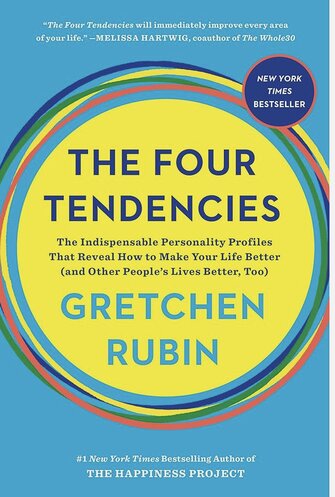Based on a question she was curious about, “How do I respond to expectations?” author Gretchen Rubin discovered that people fit into Four Tendencies: Upholders, Questioners, Obligers, and Rebels. In The Four Tendencies: The Indispensable Personality Profiles That Reveal How to Make Your Life Better (and Other People’s Lives Better, Too), Gretchen provides a framework for understanding behavioural patterns and how we primarily respond to expectations.
How do you respond to expectations? Two kinds of expectations:
- Outer expectations—expectations others place on us, like meeting a work deadline
- Inner expectations—expectations we place on ourselves, like keeping a New Year’s resolution
Depending on a person’s response to outer and inner expectations, that person falls into one of four distinct types:
Upholders
- Respond readily to both outer expectations and inner expectations
Questioners
- Question all expectations; they meet an expectation only if they believe it’s justified, so in effect, they respond only to inner expectations
Obligers
- Respond readily to outer expectations but struggle to meet inner expectations
Rebels
- Resist all expectations, outer and inner alike.
How the Tendencies Weave Throughout Our Characters
Our Tendencies are hardwired: they’re not the result of birth order, parenting style, religious upbringing, gender. They’re not tied to extroversion or introversion. They don’t change depending on whether we’re at home, at work, with friends. And they don’t change as we age. We bring these Tendencies into the world with us.
“Unless we go through some catastrophic, character-reshaping experience—such as a near-death experience, a grave illness, or a serious bout with addiction—our Tendencies don’t change.”
The Four Tendencies framework isn’t meant to be a box that cramps our growth or a label that determines everything about us, but rather a spotlight that can illuminate hidden aspects of our nature. When we understand ourselves and how our Tendency shapes our perspective on the world, we can adapt our circumstances to suit our own nature—and when we understand how other people’s Tendencies shape their perspectives, we can engage with them more effectively.
Upholders
In the Four Tendencies framework, Upholders are those people who readily respond to outer and inner expectations alike. They meet the work deadline, and they keep the New Year’s resolution, without much fuss. For the most part, they want to do what others expect of them—and their expectations for themselves are just as important
Because of their readiness to meet outer and inner expectations, Upholders also tend to love schedules and routines—they’re the people who wake up and think, “What’s on my schedule and to-do list for today?” They like to know what’s expected of them, and they don’t like making mistakes or letting people down—including themselves.
For an Upholder
- It’s not hard to decide to act and then to follow through. For many people, it’s not as simple.
Strengths (and Weaknesses)
Upholders readily meet outer expectations. They’re self-directed and have little trouble hitting deadlines, keeping appointments, meeting commitments, or managing tasks—and they don’t depend on supervision, oversight, reminders, or penalties to stay on track.
Upholders are often very intrigued by rules.
Upholders usually don’t mind wearing a uniform, following a precise recipe, or obeying instructions. Just as Upholders readily meet outer expectations, they meet inner expectations. If Upholders decide to do something, they do it—even when other people don’t care, and sometimes, even when other people are inconvenienced.
It’s a rare and extreme sort of personality.
Independence and Self-mastery
Because of their desire to meet outer and inner expectations, Upholders are independent and reliable, and they have a high degree of self-mastery. If they tell you that they’re going to do something, they do it. For Upholders, meeting outer and inner expectations doesn’t make them feel trapped; it makes them feel creative and free, because they can execute any plan they want.

Comments are closed.